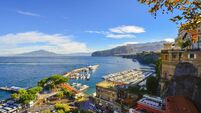Flying soon? Five ways to stay safe on summer holiday as positive Covid-19 cases rise

Should you start using a mask more often ahead of your summer holidays? Picture: AP Photo/Mark Schiefelbein
While society has made great strides in recent times to manage and reduce the threat posed by the Covid-19 virus, the facts are stark about its lasting presence in recent times.
Speaking to the Irish Examiner's Aoife Moore, HSE senior official Paul Reid said the rise in Covid-19 cases has sparked concern about a new wave of the virus spreading through at-risk sectors of society.







